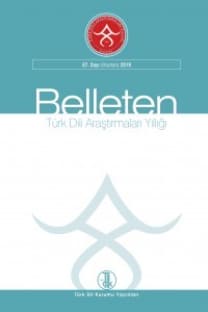Eski Türk Yazıtları ve Kazakçadaki Ortak Kelimeler
Makalede Orhun Yazıtları’nın söz varlığı incelenerek eski Türk yazıtları ile Kazakçadaki ortak kelimeler tespit edilmiştir. Çalışma neticesinde eski Türk yazıtları ile Kazakça arasında ortak 280’in üzerinde kelimenin bulunduğu ortaya çıkarılmıştır. Söz konusu kelimelerin çoğu aynı yapıda olan, sadece ses değişimine uğrayan kelimeler iken çok az bir kısmı (ubut/uyat “utanç, ayıp”, yét-/jetekte- “yedmek, yedekte götürmek”, yokad-/joğal- “yok olmak”) aynı kökten olup farklı ek alan kelimelerdir. Ortak kelimelerin her iki dilde de genel olarak birebir aynı anlamda kullanıldığı görülmektedir. Bunun yanı sıra kimi kelimelerin (kıd- “öldürmek” = qiy“kesmek, biçmek”, yabız “kötü, fena” = javız “acımasız, zalim”) çağdaş Kazakçada eski anlamına yakın olarak kullanıldığı, kimi kelimelerin (arığ “temiz, saf” = aruv “güzel (kadın)”, katun “hatun, hakanın eşi” = qatın “zevce, eş; kadın, karı”, tonlug “elbiseli, giyimli” = tondı “kürklü”) de anlam kayması, daralması ve genişlemesi gibi anlam değişikliğine uğradığı görülmektedir. Ayrıca aralarında uzak da olsa anlam ilişkisi bulunan apa, azman, eke, eren gibi biçim bakımından aynı olan kelimeler de mevcuttur
Anahtar Kelimeler:
Eski Türkçe, Kazakça, Orhun, ortak kelimeler
The Common Words in Old Turkic Inscriptions and Kazakh Language
An article was written as an attempt to determine common words in Old Turkic inscriptions and Kazakh language through examining the vocabulary of the Orkhon Inscriptions. The study has revealed that there are more than 280 common words in the old Turkic inscriptions and Kazakh language. Most of the mentioned words are of the same structure and have undergone phonetic change, while a very small part of them (ubut/uyat “modesty, shyness”, yét-/jetekte- “to tow, to lead”, yokad-/joğal- “to perish”) are words from the same root having different affixes. The common words in both languages in general are being used in exactly the same meaning. Along with that it is seen that some of the words in contemporary Kazakh are used close to the old meaning (kıd- “to kill” = qiy- “to cut”, yabız “bad; inauspicious” = javız “machiavellian, oppressor”); furthermore certain words have undergone semantic changes (arığ “clean, pure” = aruv “beauty (woman)”, katun “queen” = qatın “wife; woman”, yılkı “herd of horses” = jılqı “horse”) such as semantic transfer, semantic restriction and semantic extension. Besides, it was found that there are words e.g. apa, azman, eke, eren which have remote semantic relations between them, though same words are available in terms of word format
Keywords:
Old Turkic, Kazakh, Orkhon, common words,
- ISSN: 0564-5050
- Başlangıç: 1953
- Yayıncı: Türk Dil Kurumu
Sayıdaki Diğer Makaleler
Unknown Lutsk Karaim Letters in Hebrew Script (19th-20th Centuries) A Critical Edition
Tariat ve Xi’an (Karı Çor Tegin) Yazıtları Işığında sın ‘mezar’ Sözcüğü Üzerine
Uygur Budizminde Şuur Öğretisi
Moğolcada sayin ve Türkçede sağ Kelimeleri Üzerine
Talât TEKİN, Dolgwǒrǒ Munbǒp, Çev. Yong-Sŏng LI, Seul 2012, 509 s.
Eski Türk Yazıtları ve Kazakçadaki Ortak Kelimeler
